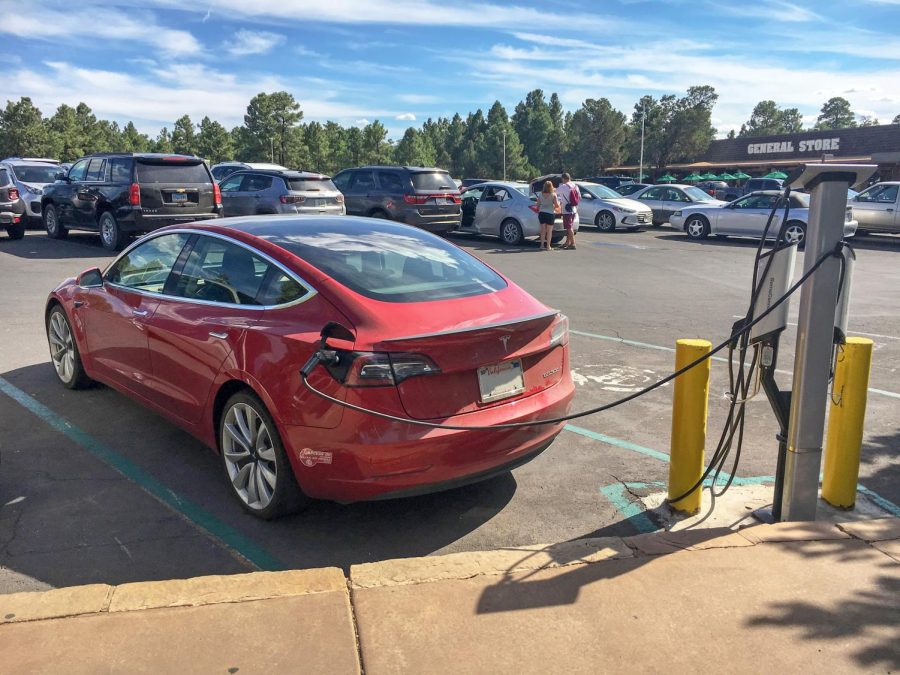Electric Vehicles in Rural Nebraska
Photo by Grand Canyon NPS. Photo Courtesy Creative Commons.
November 17, 2022
With the rise of global awareness regarding climate change, alternative fuel vehicles rise with it.
Electric vehicles have been offered for quite some time now, but Tesla’s luxury and novelty approach to this gas free vehicle has created waves in car culture across America. Both the East and West Coasts have dramatically reformed their infrastructure to handle and charge new electric vehicles.
Surely, with the large reform on the rise, Nebraska’s Wayne should follow, but when resources to develop electric cars are drastically short in supply and rural America’s farm industry is run on the liquid remains of plant and by gone animals, things aren’t so simple.
According to Nebraska’s DMV, 2,445,337 motor vehicles were registered in the state last year. Of Nebraska’s cars, only 0.10% of them were electric vehicles, ranking 42nd overall in the United States. That number seems small, but in fact, that represents 1,810 electric vehicles. In the state, there are 182 charging stations, a rate of 20.8 charging stations per 100 vehicles.
The city of Wayne has several charging stations, one at the city office, and Arnie’s dealership in town has a couple that are free to use for customers. These statistics do not fall in line with the common perception that electric vehicles do not have enough infrastructure in the area to support them in their current state, however, the cost of acquiring these vehicles is another issue.
Luke Virgil, executive director of economic development in Wayne, offered many insights into how electric vehicles affect the Wayne area.
“I think it’s going to be mixed at first, just because there’s not a lot of people that have the capacity to purchase electric vehicles,” Virgil said. “They’re still fairly expensive. It’s not just the expense of the vehicle, it’s also infrastructure, whether in their home or here in the community that is needed to support electric vehicles. We’re so programmed with gas powered vehicles or diesel powered vehicles that it’s tough to make that transition quickly. The Arnie’s Ford here in town, the local Ford dealership, they’ve actually sold several electric vehicles.”
In fact, Arnie’s has offered hybrid vehicles for quite some time.
“It started out, way back in the day, the Mercury mariners where you could get electric, but nowadays you got the Mustang Mach-e GT, the, the California special, you know, all those types of variants, but you can get the escape hybrid,” Nick Junck of the Arnie Ford Dealership said. “You can get the Fusion hybrid. Now you can get the Explorer Hybrid and the Ford F150 Lightning.”
The prospective buyers of a primarily farmer based town aren’t too high, Junck said. With gas and diesel trucks coming in a higher price than some of the base models of the electric Ford trucks, Junck said electric vehicles are geared more towards the coasts for people with green thumbs.
“It’s a pretty tough demographic in Wayne, Nebraska, because we’re more of a farm community, but we sold a few in the surrounding communities,” Junck said.
Environmentally aware people seem to be the forefront of these electric vehicle purchases, or rather environmentally aware people with the means to purchase a vehicle. Supplies to manufacture the batteries to create these cars are low, but the demand seems to be high in certain cases. Virgil said he believes the reason why the electric vehicles are commonly seen as overly expensive is because that’s at the forefront of publicity.
“I’d say (the cars) are the most visible that people are actually seeing around the community,” Virgil said. “They’ve been very publicized by Ford and the other automakers like Tesla, you know. GM now has a fleet of electric vehicles that they’ve been pushing out there and, and marketing very heavily.”
But, what if there was affordable options for buyers looking to limit their impact on carbon emission? What would Wayne look like then? According to Virgil, he said the culture surrounding charging and how long it takes would have to change. The American road trip would no longer be streamlined with three minute gas stop and goes. Instead, Virgil said drivers will have to plan out stops and take their time while on the road. This in turn, should produce local commerce, if charging ports are put in major places around town, Virgil said.
So, with all the options laid out, and the hypotheticals out of the way, at the end of the day, even with all the resources in hand, electric vehicles seem to be a cultural concept instead of an environmental benefit as seen by the people of Wayne.
“I think it always comes down to a lifestyle choice,” Virgil said. “There’s some people that just don’t care. They’re just going to say, ‘It’s not in my vocabulary to worry about climate change. It’s not in my vocabulary to worry about electric vehicles or, whether or not that’s, that’s something that I need to have in my life’. They’re going to say, ‘we’re just not going to worry about it right now and they’re going to stick with a diesel pickup, or maybe they’re going to have a gas-powered car.”
Although, that isn’t the end of it. Virgil had some words of encouragement to dispense.
“So (this change) might take a little bit longer, but I think we’ll get there,” Virgil said.








